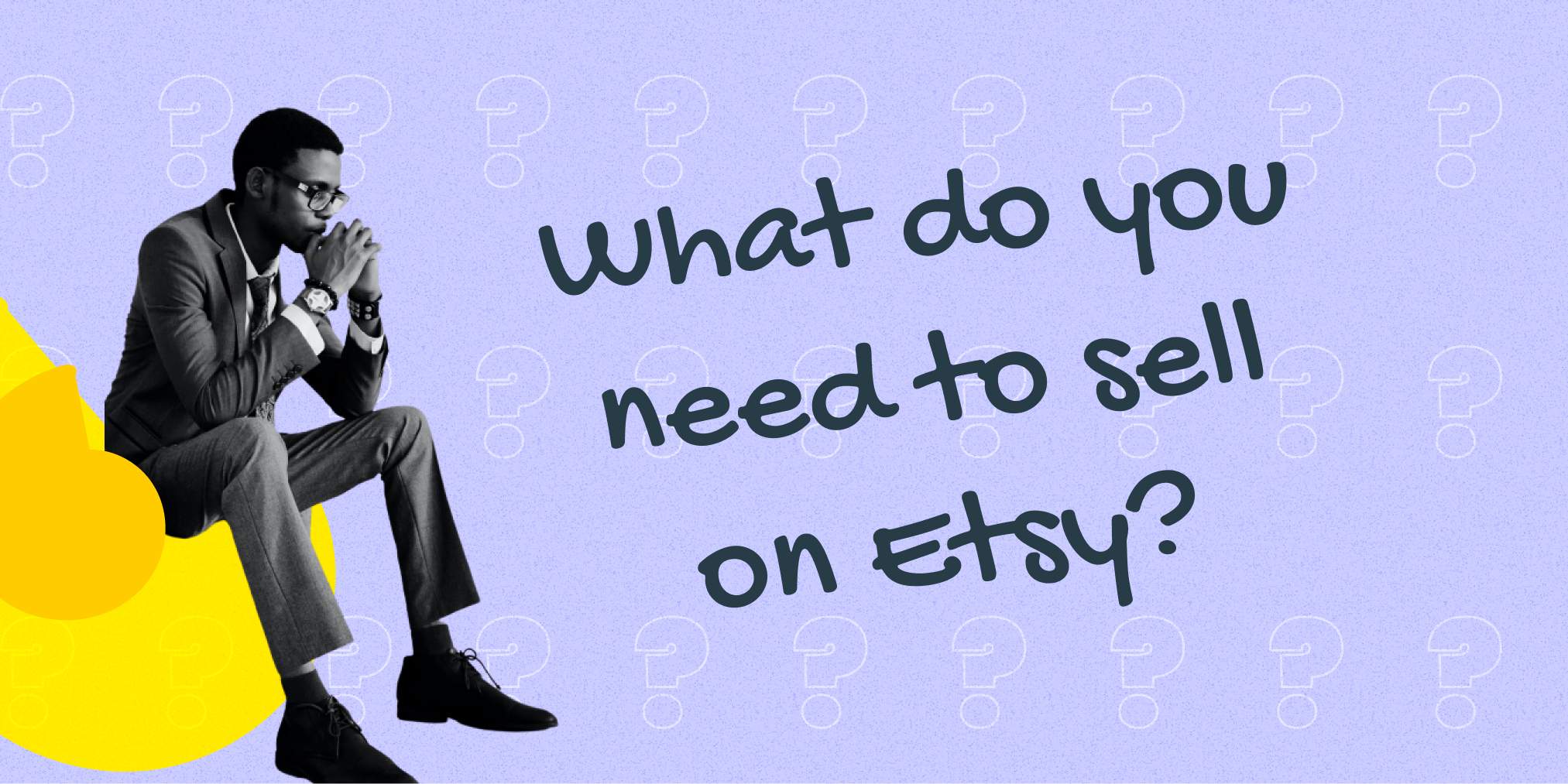
Selling on Etsy is a great way to start your own business. But do you need a business license to sell on Etsy? Learn everything about Etsy licenses & permits.
Are you an artisan entrepreneur looking to sell your handmade goods on Etsy? Congratulations on taking the first step to turning your passion into a business! The marketplace hosts more than 96 million active shoppers, and is the ideal place to start your online business. However, before you start listing your products, you might be wondering: do you need a business license to sell on Etsy? The answer may surprise you.
In this article, we’ll explore the ins and outs of selling on Etsy, and wheaton’ther or not you need a business license to make it official. So grab a cup of coffee and let’s dive in!
Do you need a business license to sell on Etsy?
Are you considering selling your handmade crafts to join the ranks of Etsy top selling items, but are unsure whether you need a business license? Well, the good news is the marketplace doesn’t require you to have one.
However, before you dive headfirst into setting up your shop, it’s crucial to do your research and make sure you’re complying with local and state laws. Although Etsy doesn’t require a business license, your local government might. It’s always better to be safe than sorry, right?
So, don’t skip your homework! Take the time to check the laws and regulations in your area to see if you need any specific licenses or permits to sell your products. By doing so, you’ll be able to avoid any potential headaches down the line.
Although it may sound like a lot of work, trust us, it’s worth it. After all, the last thing you want is to have your business shut down or face penalties for failing to comply with the regulations. So, roll up your sleeves, do your due diligence, and enjoy the rewards of selling your unique creations on Etsy!
What do you need to sell on Etsy?

Etsy, the online marketplace that has carved out a niche for itself as the go-to destination for unique and authentic products. And if you’re thinking of joining the community as a seller, you need to know about the latest Etsy shop requirements:
- Handmade items are a major part of Etsy’s marketplace, and if you’re looking to list your creations you must be actively involved in the design and manufacturing process. Additionally, the platform requires transparency from sellers, including information about production partners and anyone involved in the making of the item. For those selling vintage items, the item must be at least two decades old to meet Etsy shop requirements.
- Starting a craft business on Etsy also has a simpler set of requirements. Firstly, you must be open about how their craft supplies were produced and the source of their materials. Furthermore, As a company that values authenticity and intellectual property rights, Etsy strictly prohibits reselling and has put measures in place to prevent such practices.
- Despite meeting all the marketplace criteria, certain products may not be listed on Etsy due to prohibited categories or services. To avoid any confusion, we recommend you to familiarize yourself with the full terms and conditions outlined on the Etsy Seller Policy page.
Once approved as an Etsy seller, it is crucial to maintain excellent customer service and ensure that the products delivered to buyers meet the high standards of the platform. We recommend following our Etsy SEO tips to avoid common listing errors and offer the best shopping experience to the shoppers. Sellers who fail to comply with Etsy’s Seller Service Level Standards may be contacted by the company for further action. In summary, becoming a successful seller requires adherence to the Etsy shop requirements, policies and a commitment to exceptional service.
Which Businesses Need A License on Etsy?
When it comes to selling on Etsy, it’s important to know whether your business needs a license or not. The answer isn’t always straightforward and can depend on a few factors.
- First and foremost, what type of product are you selling? Different products may require specific licenses or permits, so it’s important to do your research and check with your local government to see if your product requires any special certifications. From homemade healthcare & beauty products to vintage clothing, each item may have its own set of rules to follow.
- Second, how are you running your business? If you’re a sole proprietor, you don’t need a license to operate. But if you have a partnership or limited liability company (LLC), you will probably have to register the Etsy business with your state or local government.
- Finally, how much are you selling? The number of sales are taken into consideration. Some states have a threshold for how much revenue you can make before needing a license. Again, the best practice is to check with your local government to see if this applies to you.
In short, selling on Etsy can be a breeze – but make sure you have all the necessary licenses and permits to avoid any legal hiccups down the road.
If you’re considering selling on Etsy, it’s crucial to understand the legal requirements and whether you need a business license. Beyond legalities, a virtual receptionist can streamline customer service, handle inquiries, and free up your time to focus on creating and listing products, enhancing your shop’s reputation and efficiency.
Factors To Consider When Getting A Business License for Etsy
If you’re thinking about acquiring a business license for your Etsy shop, First, ask yourself: do you want to run your Etsy shop as a hobby or a full time business?
If you’re running a business – that is, you’re selling with the intent of making a profit – then you’ll need an Etsy business license. But if you’re just doing it for fun, as a hobby, then selling without a business license shouldn’t be a problem. Keep in mind you’ll have to pay sales tax regardless.
So, how can you figure that out? If you’re regularly selling items, setting prices, and promoting your shop, you’re probably running a business. On the other hand, if you’re just selling things every once in a while and not really trying to make a profit, you’re likely engaging in a hobby.
Once you’ve determined that, you can take the next steps toward getting the right licenses and permits for your Etsy shop. If you’re concerned about covering those upfront filing fees or stocking up on materials, consider exploring small business loans so your shop can launch without draining your savings.
How to apply for Etsy business license?
After you’ve established that your Etsy shop is indeed a business, it’s time to apply for an Etsy Business license.
Register Business Name
Choosing a company name that embodies your brand’s essence and distinguishes you from your sellers and businesses is the first stage in the process. Your company name should be distinctive, catchy, and adhere to Etsy’s store name guidelines. Once you’ve chosen a name, you must determine whether it is already taken before registering it with the relevant government.
Choosing Business Model
Next, you’ve to decide how you want to structure your business legally. Think of it like building a house – you need a solid foundation to support your dream.
There are a few options to choose from: sole proprietorship, partnership, or limited liability company (LLC). Each has its own perks and drawbacks, so it’s essential to do some research to figure out what’s best for you.
But don’t worry, you don’t need a law degree to make the right choice. Just think about what makes sense for your business goals and budget.
Once you’ve decided on your legal structure, it’s time to get down to business. You’ll need to register with the right government agencies and make sure you’re following all the rules and regulations.
Inquiry about other Legal requirements
After registering your company, you should check with your local government to see if your business needs any additional federal licenses or permits. Additionally, you can reach out to your local small business administration (SBA) which can also offer advice on various laws you must abide by in order to properly run your company.
While obtaining licenses and permits may seem like a daunting task, it’s essential for running a successful business on Etsy. By taking the time to complete these steps, you’ll be well on your way to building a thriving Etsy shop that’s legally compliant and ready for growth.
Legal Considerations to Run an Etsy Store

Legal considerations can be a crucial aspect of running a successful Etsy business. It’s important to understand the various licenses, permits, and regulations that apply to your specific situation to ensure that you operate within the law. Here are a few legal considerations you should keep in mind:
Business Operation License
Before you start selling your handmade goodies for profit, make sure you have the proper documentation to operate legally. This means registering Etsy business and obtaining a license that guarantees you’re playing by the rules within your local area.
Now, I know that diving into state and local laws might not be your idea of a good time. But trust me, it’s a lot less fun to face the consequences of breaking those laws. So, take the time to research what Etsy business licenses you need to avoid any unpleasant surprises down the road.
If you’re not sure where to start, you can always reach out to your friends in the small business administration. They’re there to help you navigate the ins and outs of the licensing process and ensure that you’re operating your Etsy shop legally.
Employee Identification Number
As an Etsy seller, you’re like a captain navigating a ship through choppy waters. And just like a captain needs a compass to stay on course, you need an Employer Identification Number (EIN) to keep your business sailing smoothly.
Think of your Etsy EIN as your lighthouse, guiding you through the murky waters of taxes and regulations. As a sole proprietor, you might not need an Etsy EIN number. However, if you’re running a partnership or an LLC, it’s like setting sail without a map. You might end up lost at sea, with the IRS hot on your trail.
So don’t be caught adrift without an Etsy EIN. Get it done, and enjoy the peace of mind that comes with knowing you’re following all the rules. After all, you’re the captain of your own ship, and you’re destined for success on the high seas of Etsy. And why stop there? You can go even further and use Etsy Shopify integration to explore the tapped territories.
Home Occupation Permit
If you’re thinking about running your business from the comfort of your own home, there’s one important thing you need to know: you gotta get a home occupation permit. Trust us, you want to avoid messing around with the authorities on this one.
Now, we know what you’re thinking. “But wait, it’s just a little side hustle. Do I really need a permit?” The short answer is yes. Even if you’re just selling a few knick-knacks on Etsy, the authorities consider it a business or commercial activity. And that means you need to play by the rules and register your Etsy business.
The good news is, most cities have regulations that allow home-based businesses. But here’s the catch: you need a permit from your local government. Otherwise, you’re treading on dangerous waters. And let’s be real, you don’t want to be known as the renegade entrepreneur who flouted the law.
So, don’t be afraid to register your Etsy business and get the home occupation permit. It’s like a stamp of approval from the government, saying, “Hey, this entrepreneur knows what they’re doing.” And who doesn’t love a little validation? Plus, once you have your permit, you can run your business with peace of mind, knowing that you’re in compliance with the law.
Physical vs Digital Sales Tax.
The second thing on our checklist is all about taxes, and let’s be real, taxes are about as fun as a root canal. But if you want to make some real money on Etsy, you have to know the tax requirements for physical and digital products. Additionally, you should also learn about Etsy hidden fees to price your products accordingly.
Here’s the tricky part: tax requirements vary by country and city. It’s like playing a game of whack-a-mole. In some places, selling digital products is tax-free, while in others, you might still get taxed. And don’t even get us started on physical products. It’s a tax jungle out there.
So, before you set up your Etsy business account, do your homework on taxes. Make sure you know the ins and outs of how you can be taxed on your sales. It might not be the most thrilling topic, but trust us, it’s worth it in the end. You don’t want to be hit with a huge tax bill down the road, like a ton of bricks falling on your head.
Remember, knowledge is power. The more you know about taxes, the better equipped you’ll be to navigate the wild world of Etsy.
Selling Food on Etsy
Hungry for some success on Etsy? Well, if you’re thinking of selling food, you need to know that it’s a whole different ball game. The requirements and regulations on production, quality control, packaging, shipping time, and selling food differ from place to place. And trust us, you don’t want to mess around with local food regulations.
Before you start whipping up batches of your famous homemade jam or grandma’s secret recipe cookies, make sure you do your due diligence. Contact your local law advisors and find out what the requirements are for selling food in your area. Don’t assume you know everything because, let’s be real, food regulations are like a recipe with a million ingredients.
Once you know the requirements, follow them to the letter. Don’t cut corners or try to take shortcuts. You don’t want to end up with a batch of expired food or a customer with a case of food poisoning. That’s like selling your soul for a bag of peanuts.
But hey, don’t let the regulations scare you off. Selling food on Etsy can be a deliciously lucrative venture. Just keep your eyes on the heat so you don’t burn your hands.
Does Etsy require a business license?
So, do you need a business license to sell on Etsy? The answer is…it depends! If it’s your hobby then selling without a business license won’t be an issue. However, if you are planning to start a craft business or something like that, then you should look into it. While the requirements can vary depending on where you live and what you sell, it’s always a good idea to check with your local government to make sure you’re following the rules.
But don’t worry, getting an Etsy business license doesn’t have to be a headache. In fact, it can be an exciting step towards turning your Etsy shop into a legitimate business. Plus, with the Etsy business license, you’ll have access to all sorts of benefits and resources you’re not even aware of yet. Add Sellbery’s multichannel selling capabilities on top to grow your online business and thrive as an entrepreneur.
So whether you’re selling handmade jewelry, vintage clothing, or digital downloads, take the time to research the requirements in your area and get started on the path to Etsy success. And who knows, maybe one day you’ll be running your very own empire of Etsy shops!
FAQ
Do you need a tax ID to sell on Etsy?
You only need a tax ID if you’re selling products on Etsy for profit and as a business practice. After you’ve reached your regional annual sales threshold you’ll be required to provide a Tax ID.
Do you need a seller’s permit to sell on Etsy?
A seller’s permit is not a requirement to sell on Etsy. Casual hobbyists and artists can sell without a business license and seller permit.
Can you sell on Etsy without a business license?
Yes, you can if you’re selling on Etsy as a hobby. However, if you want to sell for profit you should get relevant Etsy business licenses so you don’t run into any troubles with the authorities.
Do you need a business license to sell crafts?
You can sell crafts on Etsy as a hobby but if you want to sell them for profit it’s better to acquire an Etsy business license.
What does it take to start an Etsy shop?
Creating a shop on Etsy is very simple. All you need is the shop name and set up billing and payment methods.
How to start an Etsy shop legally
Research and find out all the Etsy business licenses you need. Fulfill all the requirements and submit the applications. After they are approved by the relevant regulatory authorities, start your business activities.
Do you need an EIN to sell on Etsy?
You only need Etsy EIN if your business is registered as, an incorporation, LLC or partnership company.
What type of business is Etsy
Most sellers on Etsy are sole proprietors but there are partnership and LLC businesses as well.
Is Etsy considered a small business
Although Etsy is considered to be an ideal marketplace for small businesses, sellers have the potential to generate large profits.
Was this news helpful?







 Yes, great stuff!
Yes, great stuff! I’m not sure
I’m not sure No, doesn’t relate
No, doesn’t relate



